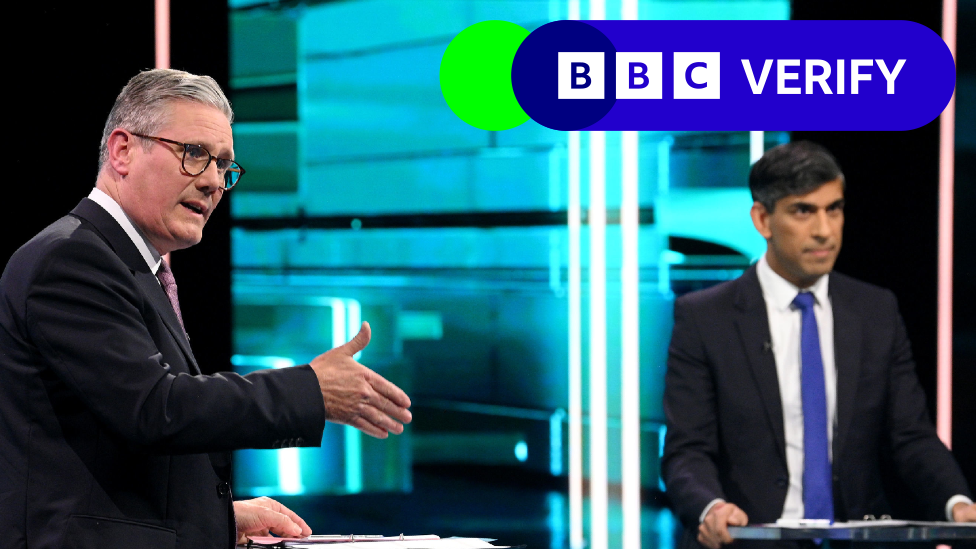PM lied about Labour's tax plans, Sarwar says
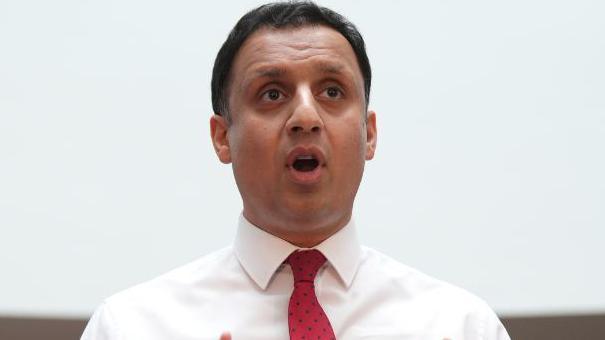
Scottish Labour leader Anas Sarwar says Rishi Sunak is "desperate"
- Published
Rishi Sunak lied about Labour's spending plans in a televised general election debate, according to the party's leader in Scotland.
Anas Sarwar accused the prime minister of spreading "deliberate misinformation" when he said working families would face a £2,000 tax rise under Labour, based on costings by "independent Treasury officials".
A letter from the Treasury, seen by the BBC, has cast doubt on the Conservative claims.
Scottish Tory leader Douglas Ross denied Mr Sunak lied, while SNP minister Kate Forbes said both Labour and the Conservatives were committed to "stinging" spending cuts.
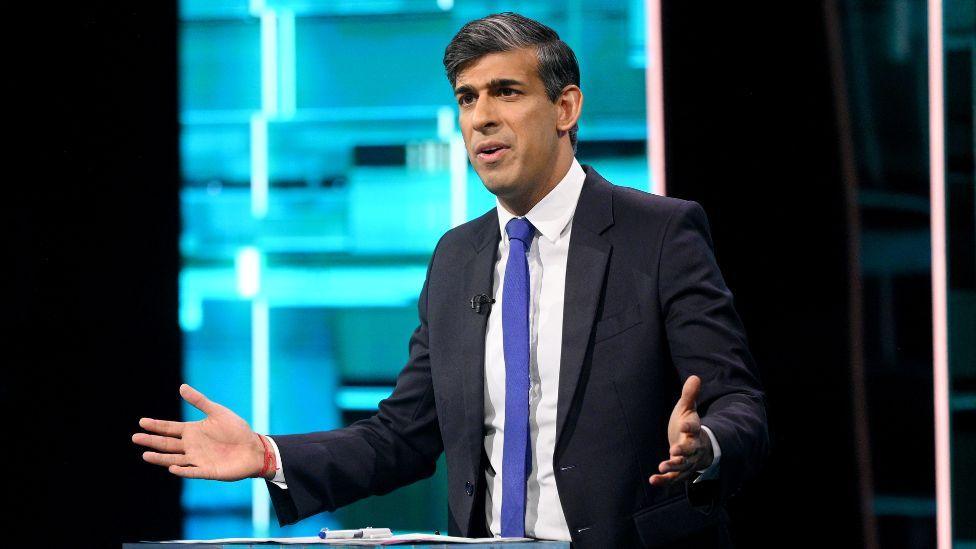
Prime Minister Rishi Sunak has been accused of making false claims during the ITV debate
In an ITV debate with Sir Keir Starmer on Tuesday, Mr Sunak claimed "independent Treasury officials" had found Labour’s plans included £38bn of uncosted spending, which he said would “amount to a £2,000 tax rise for every working family".
But the chief Treasury civil servant James Bowler said in a letter to Labour two days ago that the Conservatives' assessment of their tax plans shouldn't be "presented as having been produced by the civil service".
In a document seen by the BBC, he wrote that “civil servants were not involved in the production or representation” of calculation of the figure.
He added: “I agree that any costings derived from other sources or produced by other organisations should not be presented as having been produced by the civil service."
The Office for Statistics Regulation, an independent arm of the UK Statistics Authority, has confirmed it is investigating Mr Sunak’s claim.
It was calculated by adding up how much the Conservatives claim Labour’s spending plans would cost, and dividing this by the number of UK households with at least one person working.
The overall figure of £38.5bn, which would apply over the next four years, has been disputed by Labour.
'Deliberate misinformation'
Mr Sarwar, during a campaign visit in Glasgow, described Mr Sunak's comment as "absolute deliberate misinformation and a lie from a desperate prime minister”.
He added: “There will not be tax rises for working people.”
Labour Treasury spokesperson Rachel Reeves, also in Glasgow, told BBC Scotland News: “The prime minister lied in the debate last night about Labour’s tax plans. Labour will not be increasing taxes on working people.”
While parties have not yet published their manifestos, Labour has ruled out hikes on income tax, National Insurance and VAT.
Changes to National Insurance and VAT would apply to Scots, but income tax is devolved and set by the Scottish government.
Currently, people who earn more than £28,850 in Scotland - slightly above median earnings - pay more income tax than they would elsewhere in the UK, with those earning less than that amount paying slightly less.
Mr Sarwar also accused the SNP of a "petty attack" for criticising both leaders' failure to mention Scotland's football team when asked about the Euros during the debate.
“Of course an England fan is going to support England at the Euros," he said.
On accusations that Scotland as a whole had been ignored during the debate, Mr Sarwar said Labour would provide more funding for the NHS, schools and working people north of the border through its spending plans.
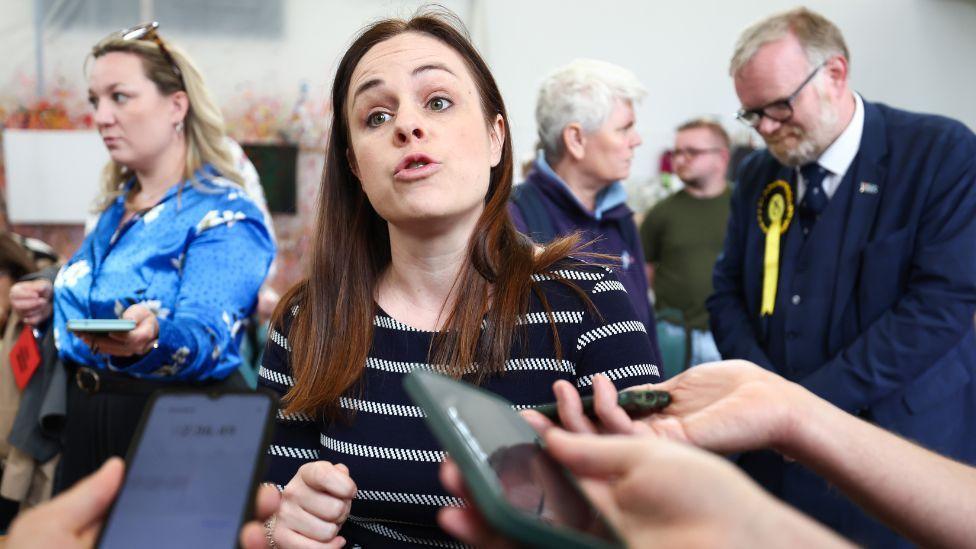
Deputy First Minister Kate Forbes spoke to reporters during a visit to Linlithgow
Ms Forbes, campaigning for the SNP in Linlithgow, said both Labour and the Tories would implement "stinging cuts" that would "inevitably have an impact on Scotland”.
She told BBC Scotland News: “The SNP’s progressive taxation is mitigating against the austerity that has been introduced by successive UK governments, and Labour and the Tories are not diverging all that much from the original Tory budget.”
Ms Forbes said both leaders had been north of the border in recent weeks making “positive noises” about Scotland but that “in the first national debate, neither mentions Scotland once”.
She added “that says all that you need to know about the next few years”.
Scottish Tory leader Douglas Ross denied that Mr Sunak had lied about Labour's tax plans.
He said the prime minister’s claim “seems to be true” because Sir Keir had failed to “refute” Mr Sunak’s comment.
Mr Ross told BBC Scotland News: “This is the real risk in this election – that Labour will put up taxes for people here in Scotland and across the UK."
He said Labour’s spending plans would leave a budget shortfall that would have to be made up through tax rises.
While the prime minister's claim about tax rises under Labour went unchallenged for about 20 minutes during the debate, Sir Keir later called it "nonsense” and “garbage”.
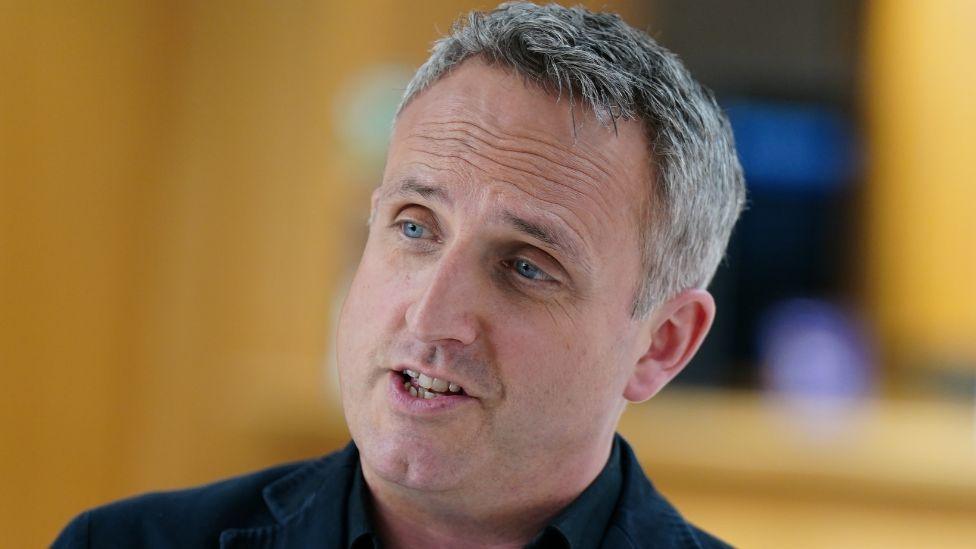
Alex Cole-Hamilton accused the prime minister of ignoring Scotland
Scottish Liberal Democrat leader Alex Cole-Hamilton said he did not watch the ITV debate.
Speaking at a campaign event in Edinburgh, Mr Cole-Hamilton told BBC Scotland News his party would raise taxes on social media companies and reverse tax cuts for big banks which could raise up to £4bn per year.
He also accused Mr Sunak of “ignoring Scotland” and said he hoped Sir Keir would not do the same if he became prime minister.
The Institute for Fiscal Studies (IFS) has said, external Mr Sunak’s claim was “not independently arrived at or verified”.
IFS director Paul Johnson said that while spending plans are yet to be published, both parties appear to be committed to a “substantial” tax rise by freezing personal tax allowances and thresholds for the next three years, raising £11bn per year.
He added: "It looks more likely than not that either party would need to raise taxes if they want to avoid serious spending cuts and meet the fiscal rules to which they have both signed up."
The Conservatives insisted their figures were "fair to Labour", using Labour costings or official Treasury costings.
- Published4 June 2024
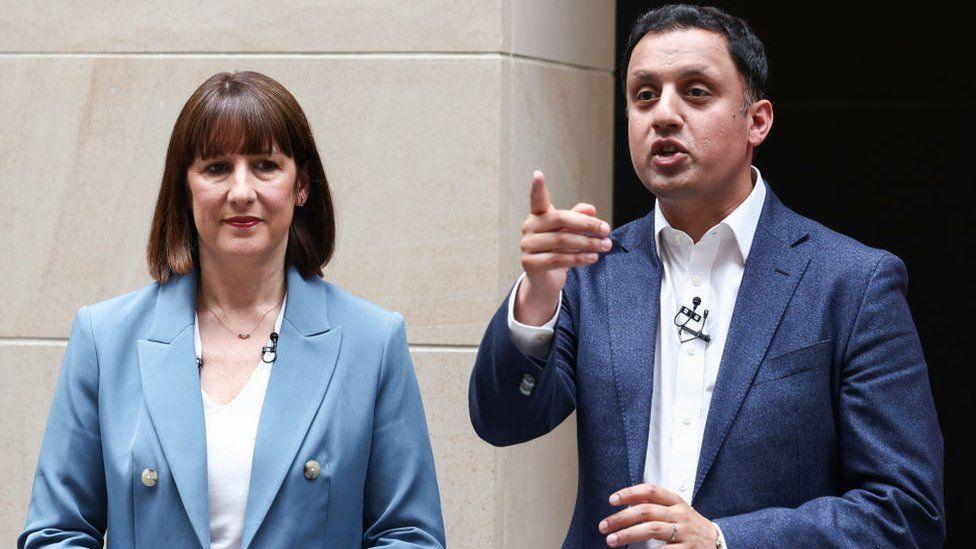
- Published4 June 2024
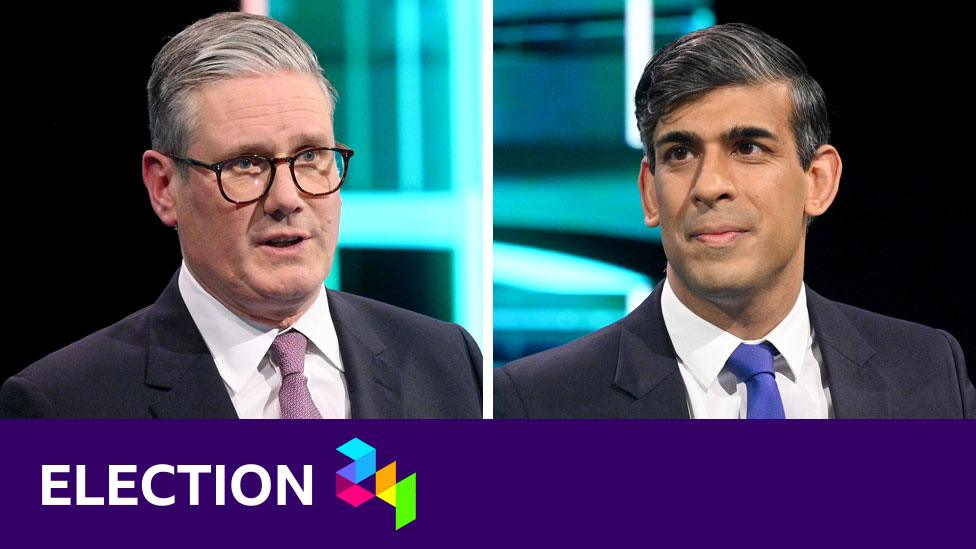
- Published5 June 2024
